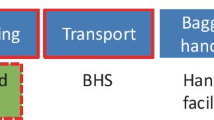Abstract
The shared self-service check-in system can effectively alleviate the tension of airport caused by limited resources in the future. The effective allocation of resources is the key to improving the performance of this collaborative work system. In this paper, an associative decision integer programming model is established to quantitatively describe the total baggage handling time of the collaborative work system by using piece-wise functions under different allocation schemes. In order to meet passengers’ expectation of queuing time, the queue system is optimized to constrain the service level, and eventually the system efficiency is significantly improved. The discrete event simulation results show that the allocation scheme generated by the model can not only largely improve the equipment utilization rate by 124%, but is also able to shorten the queuing time of passengers by 72.8%, which provides the possibility to comprehensively optimize and improve the efficiency of future airport baggage handling systems.









Similar content being viewed by others
Data Availability
The data that support the findings of this study are derived from public domain resources. These prior studies (and datasets) are cited at relevant places within the text as references.
References
Adacher L, Flamini M (2019) Check-in counters management: the case study of Lisbon airport, pp 228–234. https://doi.org/10.5220/0007834302280234
Al-Sultan A (2016) Optimization of airport check-in scheduling at passenger terminal. J Appl Econ Bus Res 14:3233–3245
An H, Choi SS, Lee JH (2019) Integrated scheduling of vessel dispatching and port operations in the closed-loop shipping system for transporting petrochemicals. Comput Chem Eng 126:485–498. https://doi.org/10.1016/j.compchemeng.2019.05.003
Araujo GE, Repolho HM (2015) Optimizing the airport check-in counter allocation problem. J Transp Lit 9(4):15–19
Chun HW, Mak R (1999) Intelligent resource simulation for an airport check-in counter allocation system. IEEE Trans Syst Man Cybern C Appl Rev 29(3):325–335
Dijk NMV, van der Sluis E (2006) Check-in computation and optimization by simulation and IP in combination. Eur J Oper Res 171(3):1152–1168
Dong F (2018) SITA: future airport self-service vision. Civil Aviation Administration of China Publishing CARNOC. http://news.carnoc.com/list/458/458279. Accessed 16 Aug 2018
Esteves CMC (2018) Automated airport check-in: developing an agent-based model. Ph.D. thesis, ULisboa
Giuseppe B, Antonio D, Andrea G, Carmela P (2018) A decision support system to improve performances of airport check-in services. Soft Comput. https://doi.org/10.1007/s00500-018-3301-z
Guo W, Gang Y, Song M (1997) Optimization model and algorithm for crew management during airline irregular operations. J Combin Opt 1(3):305–321
Hsu CI, Chao CC, Shih KY (2012) Dynamic allocation of check-in facilities and dynamic assignment of passengers at air terminals. Comput Ind Eng 63(2):410–417
Huang Y (2016) Computer modeling and application research on collaborative management of passengers process in terminal. Ph.D. thesis, Nanjing University of Aeronautics and Astronautics
IATA (2014) Annual review 2014. International Air Transport Association. https://www.iata.org/contentassets/c81222d96c9a4e0bb4ff6ced0126f0bb/iata-annual-review-2014.pdf
Joustra PE, Dijk NMV (2001) Simulation of check-in at airports. In: Simulation conference, 2001. Proceedings of the winter
Kachitvichyanukul V (2012) Comparison of three evolutionary algorithms: GA, PSO, and DE. Ind Eng Manag Syst 12:215–223. https://doi.org/10.7232/iems.2012.11.3.215
Kit B, Yeung W, Chun A (1999) Check-in counter allocation using genetic algorithm, pp 197–202
Lalita TR, Manna DK, Murthy G (2020) Mathematical formulations for large scale check-in counter allocation problem. J Air Transp Manag 85:101796
Mascarenhas BV, Borille G, Alves C (2020) Methodology for assessing the service level offered in the check-in area of Brazilian regional airports. Transportes 28(5):83–98
Mota M, Miguel R (2015) Check-in allocation improvements through the use of a simulation-optimization approach. Transp Res Pt A Policy Pract 77:320–335
Park Y, Ahn SB (2003) Optimal assignment for check-in counters based on passenger arrival behaviour at an airport. Transp Plann Technol 26(5):397–416
Parlar M, Sharafali M (2008) Dynamic allocation of airline check-in counters: a queueing optimization approach. Manag Sci 54(8):1410–1424
Shijia ZTDTZ (2020) Optimal configuration of double-queuing system for check-in counters in terminal building. Aeronaut Comput Technol 50(05):52–56
SITA (2019) Passenger IT Insights 2019. SITA. http://www.sata.aero/resources/type/surveys-reports/passenger-it-insights-2019
Tang Ching-Hui (2010) A network model for airport common use check-in counter assignments. J Oper Res Soc 61(11):1607–1618
Tian C (2016) Study on the dynamic resource configuration of the airport check-in: taking the capital airport t2 as an example. Value Eng 18:148–150
Wang Z, Xing W (2010) Worst-case analysis for on-line service policies. J Comb Optim 19(1):107–122
Wittmer A (2011) Acceptance of self-service check-in at Zurich airport. Res Transp Bus Manag 1(1):136–143
Yan S, Tang CH, Chen M (2004) A model and a solution algorithm for airport common use check-in counter assignments. Transp Res Pol Pract 38(2):0–125
Acknowledgements
The authors would like to thank Huang Yu for providing necessary flight and passenger data of a Chinese airport, and pay special thanks to Hsu et al. as their work provides useful information to this paper.
Funding
This work is supported by the National Natural Science Foundation of China (Grant No. U1933123).
Author information
Authors and Affiliations
Corresponding author
Ethics declarations
Conflict of interest
The authors declare that they have no conflict of interest.
Additional information
Publisher's Note
Springer Nature remains neutral with regard to jurisdictional claims in published maps and institutional affiliations.
Rights and permissions
About this article
Cite this article
Liu, Y., Yang, X., Xiang, Y. et al. Allocation and optimization of shared self-service check-in system based on integer programming model. J Comb Optim 44, 532–556 (2022). https://doi.org/10.1007/s10878-021-00839-6
Accepted:
Published:
Issue Date:
DOI: https://doi.org/10.1007/s10878-021-00839-6




